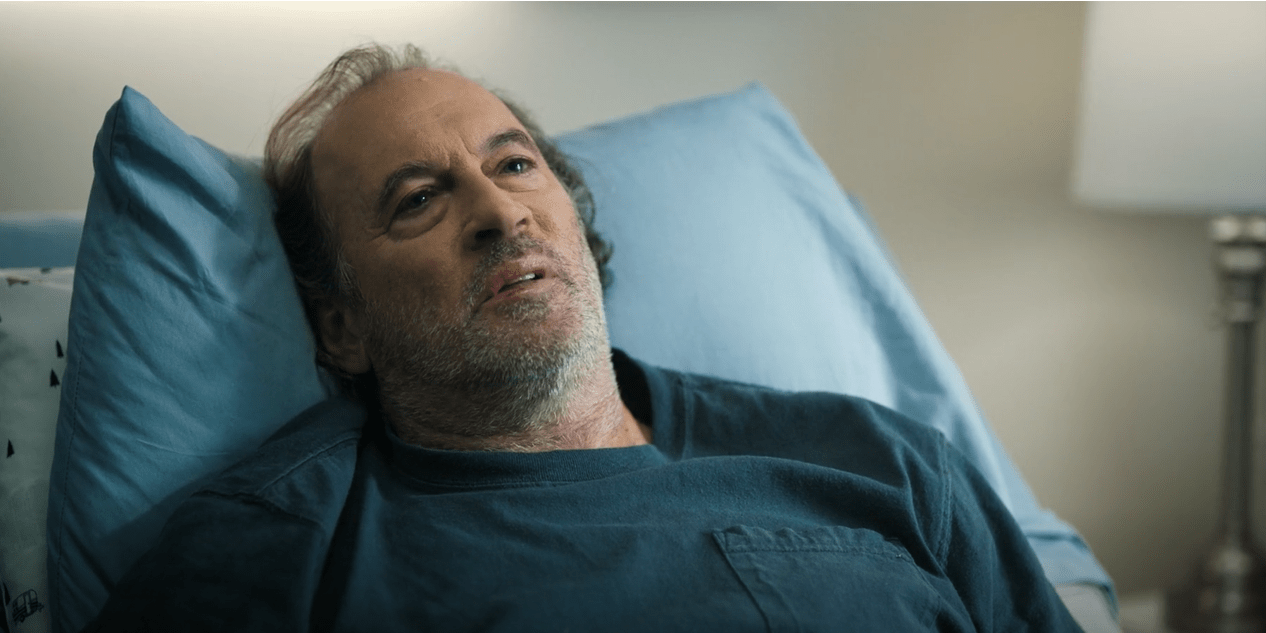‘Sullivan’s Crossing‘ focuses on the story of two Sullivans, the protagonist, Maggie Sullivan, and her father, Harry “Sully” Sullivan. The latter owns the eponymous campground, which serves as the base for most of the familial drama that takes place throughout the narrative. At the center of it all is the father and daughter’s separation when she was a child, a memory that haunts the two of them in many ways. In the present day, their relationship reaches a boiling point, after which Maggie packs her bags and leaves. Unbeknownst to her, shortly after, Sully suffers a stroke, and while he is rescued and admitted to a hospital, his troubles have just begun. Maggie, being a neurosurgeon herself, pays close attention to the case, which soon becomes an excavation into both Sully’s brain and mind. SPOILERS AHEAD.
Sully’s Diagnosis Turns Out to Be a Complicated Affair
While initially we are led to believe that Sully is showing the classic symptoms of Alzheimer’s disease, his real diagnosis turns out to be Wernicke’s Encephalopathy. Maggie is the first person to not readily buy into the idea that Sully is suffering from Alzheimer’s or its adjacent diseases. She cites her own experience as a brilliant neurosurgeon and claims that she would have noticed the symptoms prior to his stroke. The protagonist goes as far as getting a second opinion from her colleagues at Boston, but ultimately chooses to give the medical tests a go-ahead. Soon, her worst fears come true when she is told that her father’s brain has inflammation patterns similar to those of Alzheimer’s. Consequently, Sully’s stay at Timberlake Regional Hospital gets extended, and he is under more careful supervision.

Hearing the news, Maggie falls into despair, in shock at not noticing his condition sooner. Part of this is her early dismissal of his symptoms, as she ruled it to be the aftereffects of his stroke, which was deemed the result of a dissolved blood clot. She realizes that the stroke should have been her first cue to dig deep into his physiomental well-being, and her failure haunts her. Meanwhile, Sully begins to show observable symptoms of the disease, such as a lapse of memory and loss of motor control. These indicate that he is already in the more serious stages, which makes an already bad situation worse. In dealing with his condition, Sully states that he feels like he has forgotten something very important. Following this, he also has an accident wherein he falls to the floor and hits his head.
Although the injury is declared to be a minor one, it causes everyone in the family to be aware that something much worse is happening to Sully. News of his disease breaks everyone, and in particular, Lola, who confronts Maggie about not paying attention to her father. This prompts Maggie to make amends for her mistake and participate in his recovery process. However, at this point, she finds out a game-changing detail: Sully is a recovering alcoholic. When she learns of the true extent of his alcoholism, she suddenly figures out his real disease: Wernicke’s Encephalopathy, a common disease for people with a history of alcohol abuse. Maggie’s hunch turns out to be true, but it does so in a completely different manner. She had indeed missed out on his symptoms, but they turned out to be something else entirely.
Sully’s Disease and Recovery Also Hold a Symbolic Importance
Sully’s disease is treatable, and that brings some relief to his extended family. It is a big deal for Maggie also for another reason. This incident happened following the dismissal of the lawsuit filed against her on the grounds of medical negligence. In that case, she had not asked for the patient to have a CT scan, which would have revealed an internal injury that eventually cost his life. Through this, she learns her lesson to go past her patient’s explicit characteristics and dig deep into their context, such as to find the key to their betterment. Maggie applies this knowledge on a more abstract level in relation to her father, who gets better and is brought back home. Her experience, coupled with her care for Sully, contributes to his recovery.

Sully’s diagnosis not turning out to be Alzheimer’s is also important for the character, who bears a fear that he has inherited it from his father. He elaborates further, telling Maggie she doesn’t know what it did to his psyche and to the people around him. Alzheimer’s is a particularly harrowing disease, as it slowly erodes a person’s memories, making them lose their sense of self. Sully’s words suggest that his father’s final days likely traumatized him, and he does not wish to inflict that upon his daughter. His fears are complemented by a different scene featuring Cal’s memories of his father, who is revealed to be a person with Schizophrenia. Cal harbours similar fears, which end up with him deciding not to have children. Therefore, these two perspectives, between a father and a child, show how complicated family dynamics can get in the face of a disease.
The narrative significance of Sully’s disease does not end here, as it also ties intricately into his past. It is eventually revealed that years ago, he hit Lola with his car while driving it in a drunken state. While he is not registered as a suspect, and the hit-and-run case goes cold, Sully finds himself marred by guilt. He makes a conscious effort to improve Lola’s life, eventually becoming a father figure. This becomes the main memory that he forgets when he is struck by Wernicke’s Encephalopathy. Ironically, a disease caused by his drinking problems obscures his worst memories, which also finds a source in his alcohol abuse. As such, for him to improve and eventually retrieve this memory is crucial, as it sets the stage for him to come clean and pay for his sins. Thus, Sully’s disease plays a very important narrative role in furthering his character.
Read More: Sullivan’s Crossing Season 2 Episode 10 Recap and Ending Explained


